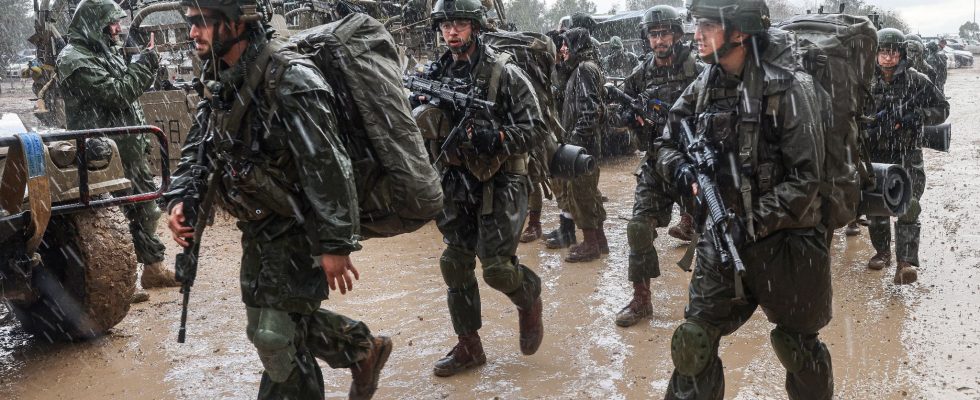“In my vision of peace, in this small territory of ours, two peoples live freely, side by side, in friendship and mutual respect. Each will have its own flag, its own national anthem, its own government. Neither will threaten the safety or survival of the other.” Anyone who uttered these words in June 2009, at Bar-Ilan University in Tel Aviv, and said he “ardently” wanted peace (even if the conditions set were considered unacceptable by the Palestinians at the time), would not do so. today for nothing in the world. His name: Benjamin Netanyahu.
Subsequently, “Bibi” continued to harden his position, affirming in 2015, in the middle of the legislative campaign, that there would be no creation of a Palestinian state as long as he was in office. The entry of the far right into his government at the end of 2022 has only radicalized his attitude.
“Avoid creating new generations of terrorists”
Since the October 7 terrorist attack against Israel, the situation has been more inextricable than ever. The war rages between the Jewish state and Hamas, causing thousands of victims among the 2.3 million Gazans and considerable destruction. More than 80% of the population has been displaced, most to the south of the enclave, where the humanitarian situation is apocalyptic. And the hope of freeing new hostages is dwindling day by day.
Amid the crash of bombs and distress, no one can predict the outcome of this terrible conflict. Our five scenarios explore possible avenues, from the worst – a war that gets bogged down – to the solution, which remained a pipe dream for a long time, and is now considered the only possible way to guarantee peace: the coexistence of two States, one Israeli , the other Palestinian, between the Jordan and the Mediterranean.
Before any discussion, the fighting must, of course, stop. We are far from it: on December 9, the day after the American veto of a UN resolution calling for an “immediate humanitarian ceasefire”, Benjamin Netanyahu insisted that Israel would “continue its just war to eliminate Hamas “. Without indicating when he will judge that his war aims will be achieved.
The fog of war is not about to dissipate, nor is the fog of peace. Liquidating Hamas fighters – if Israeli forces succeed – will end the fighting, but will not erase their ideology. “We must prevent the humanitarian catastrophe from creating generations of terrorists. The suffering of a people combined with the absence of a political perspective produces despair and violence,” insists the former Minister of Foreign Affairs, Jean-Yves Le Drian in our columns.
Create new leaders on both camps
“If Hamas is defeated, there will be a period when people in Gaza will still have radical thoughts, but without being able to implement them. We must use this period to propose a more attractive political alternative and begin a process of peace, judge Ghaith al-Omari, former Palestinian negotiator, now a researcher at the Washington Institute. But if Gaza is not rebuilt, the Palestinian Authority remains weak, discredited and corrupt, and the Israelis do not place of true cooperation, a Hamas 2.0 will emerge.”
That’s not all. “It will be necessary to organize elections in Palestine, but also in Israel, in order to provide new leaders capable of continuing the path to peace,” said Omar Shaban, director of Pal-Think, a research center based in Gaza. In Israel, many are waiting for the guns to fall silent to demand accountability. Fewer than one in five Israelis support “Bibi.” And it is difficult to imagine how the head of government could survive a commission of inquiry charged with determining his responsibility in the October 7 massacre. Except that the septuagenarian has often demonstrated his ability to bounce back. Ultimately, a historic agreement with Saudi Arabia could, for example, help it do so.
But an even greater risk awaits the region: an extension of the conflict. As the war continues in Gaza, Iran-backed Hezbollah continues to threaten Israel on its northern border. “If Hamas is really on the verge of being destroyed, Hezbollah could become more involved, and perhaps Iran as well,” anticipates Yonatan Freeman, an expert in international relations at the Hebrew University of Jerusalem.
The situation could also worsen in the West Bank, where more than 260 Palestinians have been killed since October 7, according to the Palestinian Authority. “Hamas could seek to open another front with the Israeli army,” continues this researcher. Tension is also rising in certain Arab countries, such as Jordan, where demonstrations are increasing. “The populations in Saudi Arabia, Egypt and Jordan are angry. Their leaders are calling for a ceasefire because they know that the war in Gaza could threaten the stability of the region,” explains Omar Shaban.
However, their role could be decisive in securing a peace process. “If Hamas is defeated, an international coalition with the participation of Arab countries could rule Gaza until it is rebuilt and the Palestinian Authority is rehabilitated,” imagines Ghaith al-Omari.
If Hamas is defeated…
.
